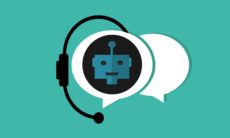January is a special month in AI history. Because in both the novel and movie 2001: A Space Odyssey, January 12 is when the HAL 9000 sentient computer — (spoiler alert!) the story’s antagonistic artificial intelligence — goes live. Depending on whether you date HAL to its “birth” in the film, the novel, or when those media originated, HAL is anywhere between 22 years to 51 years old now (For trivia buffs, of which I’m one: The book and film were released in 1968, making HAL’s conception over 50 years ago; if you go by the dates given in the film or the book, respectively, HAL is either 27 or 22 years old). HAL is then placed aboard the Discovery One spacecraft to participate in a journey of, well, discovery to the planet Jupiter.
Of course, HAL decides pretty quickly that the people on the mission are a significant roadblock to completing the mission, decides the ship and voyage would be better served without all those pesky humans running around… and tries to kill everyone onboard. Excellent sci-fi filmmaking ensues.
But is that where we are today? Are AI’s coming to kill you? Or at least coming to kill your business/your career? Let’s take a deeper look and see.
OK, so I have no idea if AI is coming to kill you. It’s definitely a question worth looking at… and clearly one of the many questions we need to be thinking about in terms of guiding standards for AI. But I don’t think that it’s the issue you’re most likely worried about.
A far more relevant question is whether AI will kill your job, your career, your business, or your industry. And the answer there is definitely far from clear. Certainly some evidence suggests that AI will eliminate a number of jobs that we take for granted today. It’s more likely still that artificial intelligence will eliminate pieces of jobs. In fact, we’re already starting to see that. Have you noticed that you can ask questions of, for example, Google Analytics and Photoshop’s Sensei AI instead of digging through reports or figuring out which tools are necessary to accomplish an effect? That’s artificial intelligence at work.
In fact, the biggest threat you face right now isn’t that AI will steal your job. It’s that smart people who know how to /use AI/ will.
The second big takeaway here is that AI isn’t something that’s far in the future. Much like 2001 — the book, movie, and the year — and our buddy HAL, it’s been here for at least a little while now. It’s shaping your experiences — and those of your customers — every single day.
For instance, Facebook already relies on artificial intelligence to police its algorithm and improve the quality of the content your friends, family, fans, and followers see on the social network. Google uses AI in its RankBrain algorithm to provide more relevant answers to the questions searchers ask. And marketing tech stack providers like Adobe, SoloSegment, and others are working to include AI in their products to create more meaningful and engaging customer experiences. [Full disclosure: I’m a partner at SoloSegment working with my team to make AI martech a reality for customers all around the world.]
Using AI for Good
HAL thought it was a good idea to wipe out its competition. I’m not convinced that makes HAL such a bad guy. I mean, that sounds just like someone you want on your sales team, doesn’t it?
All kidding aside, you shouldn’t fear AI. In fact, it’s time for you to embrace artificial intelligence and see how you can use it to help, not hurt, your business.
So, where can you begin? Well for starters, try the following:
- Learn. Spend some time reading the above links to learn a bit about how Google and Facebook’s artificial intelligence applications work in the real world right now — and how they effect your customers and business today.
- Test. Play around with various open-source AI tools available in the marketplace to see exactly the kinds of problems they’re solving today (Google has a decent round-up to get you started, but search for others once you’ve explored a little bit). There are literally hundreds of AI-powered applications already on the market. Why not try one out for yourself?
- Engage. Finally, talk with someone who’s doing this already about how you can put these tools to work for your brand and business. Yes, I have a preference. But, it’s important that you get started in any case.
Why AI Has Come a Long Way Since HAL: Conclusion
Late in the film 2001, after spending significant chunks of the movie trying to murder most of the ship’s crew, HAL famously — and ironically — tells astronaut David Bowman, “But, Dave, I still have the utmost confidence in the success of the mission.” So, yeah. That’s a pretty tough working environment.
Your experience with AI need not be anywhere near so harsh. AI is here, right now. It can help your sales, marketing, and overall business, right now. And I’m telling you with no irony that I have the utmost confidence in your ability to use AI effectively to increase sales and revenue. Right now. And unlike the crew of Discovery One, the ship in 2001, I’m confident that you’ll enjoy the journey.
Interested in how to use AI to power your business and your customer experience? Drop the fine folks at SoloSegment a line to see if they’re right for you.









